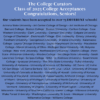
One of the more important aspects of the college application process, and the most unsettling, is selecting the people who will write your recommendations. Since you will never read these recommendations, you are flying blindly, and must trust completely. Most universities require two teacher recommendations, one counselor recommendation, and some colleges permit a fourth, optional recommendation from another, non-academic person who knows the candidate well. The admissions officers rely heavily on the opinions of these professionals, respecting that they know the applicant’s character, intelligence, and work ethic best, trusting that anonymity inspires honesty. The words and opinions of these recommenders can be extremely influential. With the school year disruption and the uncertainty of standardized testing, now more than ever, teacher and counselor recommendations will be a crucial component of your student’s college application.
Before you decide whom to ask, during the spring of 11th grade, we first recommend that you meet (virtually) with the college counselor at your high school to discuss the teachers you are considering and your high school’s deadlines for requesting recommendations. The college counselors set the stage for your application, so their input, advice, and expertise are essential. They should be able to advise you who might be a good match for you, and the area you wish to study. Second, we usually recommend that you choose teachers from your 11th grade year (obviously, there are exceptions), with whom you have a close/positive relationship. Not everyone has the luxury to know their teachers well, and we understand this, but do your best. Make a concerted effort throughout your junior year to interact with your teachers, participate in class, and go to office hours, so that your relationship is authentic, and the teachers feel connected enough to you in order to write on your behalf.
In deciding which teachers should write your recommendations, consider selecting teachers from core academic subjects, such as English, Math, Science, or History. However, if you are applying to be a Classics major you should probably ask your Latin teacher for a recommendation. Each teacher you choose should offer a different perspective on your strengths as a student and community member. It is natural to ask for a recommendation from a teacher of a subject in which you are strong, but you might consider asking for a second recommendation from a teacher of a subject matter that has been challenging, and perhaps from a different field of study. If you are a Humanities kid, a strong recommendation from a Biology teacher might serve you well in showing your range, determination, and ability to tackle difficult material. Some college counselors recommend that students request three recommendations so that they can determine which letter best matches the school or program to which you are applying.
Not everyone should submit an optional, non-academic recommendation, but if you choose to do so, this recommendation should provide additional information that shows a different side of your character and/or strengths, beyond what already appears in your other recommendations. As well, this person should be someone with whom you have interacted closely, who can critique another aspect of your personality, work ethic, or resilience, different than academics, such as a clergy member, employer, and/or coach. A generic recommendation from your Senators, unless you have worked for them and they know you personally, does not add anything.
Whomever you ask to write on your behalf, you might provide him/her with a lovely, handwritten note, requesting the recommendation and be sure to include the following information:
- How to Submit – if you are submitting your application through online portals such as Common Application or Coalition Application follow the instructions provided. Otherwise, be sure to provide your recommender with instructions, deadlines, and even a self-addressed stamped envelope to facilitate submission.
- What you plan to study at college (if you know).
- What strengths, passions, or qualities you would like them to highlight in their letter.
- Special projects or memories from class that were significant to you.
- Your resume.
- Your Brag Sheet (Check with your school to see if they have a standardized Brag Sheet you need to complete prior to requesting recommendations).
It is both a burden and an honor for anyone who undertakes the responsibility to write a recommendation, so please be respectful of his/her willingness to write on your behalf, and write a thank you note expressing your heartfelt gratitude.






